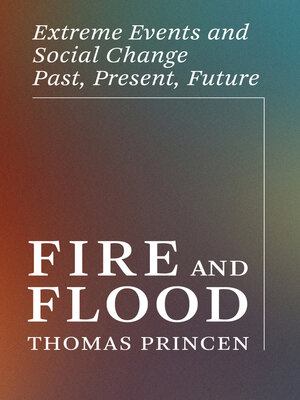Fire and Flood
ebook ∣ Extreme Events and Social Change Past, Present, Future · One Planet
By Thomas Princen

Sign up to save your library
With an OverDrive account, you can save your favorite libraries for at-a-glance information about availability. Find out more about OverDrive accounts.
Find this title in Libby, the library reading app by OverDrive.



Search for a digital library with this title
Title found at these libraries:
| Library Name | Distance |
|---|---|
| Loading... |
How extreme events, paradoxically, sow the seeds of positive response—and create opportunities for becoming adaptive to place.
Throughout our history we have dealt with extreme events, sometimes adaptively, by coping or even thriving with them, and sometimes disastrously, by repeatedly ignoring their lessons. Now extreme events and disasters are increasing in frequency and severity, and their signals are difficult to read. In Fire and Flood, Thomas Princen argues that the most useful signals may be those coming from fires and floods, both historically and today. This book looks to these past and present events to imagine—and to construct—a regenerative future.
Extreme events are much more than just confirmation of climate change. Princen’s in-depth investigation of disaster response, including our long-term societal response, goes beyond the harm and destruction, the cries for better prevention and protection, and the simplistic formula that, with mere awareness of extreme events, the world will finally “combat” climate change. We must learn to read extreme events as signals indicating how adaptive or maladaptive our patterns of extraction, consumption, settlement, and transport are, and, more generally, how sustainable and just our economies are. Understanding these signals will allow us to become adaptive to place and plan for a future living with fires and floods.
Throughout our history we have dealt with extreme events, sometimes adaptively, by coping or even thriving with them, and sometimes disastrously, by repeatedly ignoring their lessons. Now extreme events and disasters are increasing in frequency and severity, and their signals are difficult to read. In Fire and Flood, Thomas Princen argues that the most useful signals may be those coming from fires and floods, both historically and today. This book looks to these past and present events to imagine—and to construct—a regenerative future.
Extreme events are much more than just confirmation of climate change. Princen’s in-depth investigation of disaster response, including our long-term societal response, goes beyond the harm and destruction, the cries for better prevention and protection, and the simplistic formula that, with mere awareness of extreme events, the world will finally “combat” climate change. We must learn to read extreme events as signals indicating how adaptive or maladaptive our patterns of extraction, consumption, settlement, and transport are, and, more generally, how sustainable and just our economies are. Understanding these signals will allow us to become adaptive to place and plan for a future living with fires and floods.







